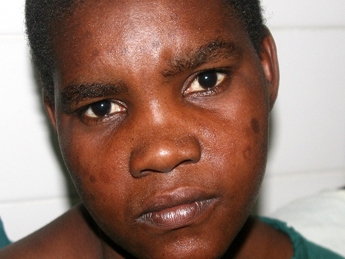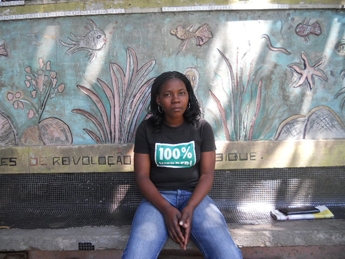
Laura (Photo by Mercedes Sayagues)

Alzira (Photo by Mercedes Sayagues)
Joy
We were elated when the United Nations Population Fund chose our video clip about Alzira to open the meeting of the International Working Group on Obstetric Fistula, in Maputo, Mozambique’s capital, on October 10.
I produced the video for my secondary partner, Women in Law in Southern Africa. This NGO runs a program on sexual and reproductive rights, lobbying against child marriage and early pregnancy - a major factor in fistula, which affects some 100,000 Mozambican women. Read more about fistula here.
Alzira
After one week with obstructed labor at the village health post, Alzira was transferred to Zavala and then to Inhambane, 166 kms away, for a caesarean. The baby was born dead. She remained incontinent, her left leg paralyzed, and with rectovaginal and vesicovaginal fistulae. That was in 2003. She was 16. “Life was very hard. I was in pain. I had no friends or family around me. Only my mother cared for me. I couldn’t walk, I couldn’t do anything.” she recalls.

Alzira (Photo by Mercedes Sayagues)
Transferred to Maputo in 2005, Alzira needed six operations to reconstruct her bladder using the appendix, the vagina with the intestines, and the rectum. The new bladder is directly connected to the abdominal wall to drain urine externally with a catheter – a technique seldom accepted in Africa but to which she has adapted well.
The video’s song - Wa ma Mima, or My Baby in Shangaan - was composed and sung by Mozambican artist Chude Mondlane, daughter of liberation hero Eduardo Mondlane. Chude lives in New York but is visiting Mozambique. Passionate about helping women with fistula, she did the music for free. Listen to the song here. [video: 42593, small]
On the screening day, Chude sat with Alzira in the centre of the auditorium at the the Franco-Mozambican Cultural centre. As the credits rolled and her song soared, Chude stood up, traditional maracas in hand, and sang a capella. The audience, some 200, were surprised. I Asked Alzira to stand up. As they recognized her, people clapped to the rhythm; the song ended in a standing ovation.
Today, the Ministry of Health showed the video clip at a national meeting on maternal health to 60 chief nurses from all the provinces, and I was asked to present it. Several NGOs and the Ministry requested copies to distribute nationwide. See movie with English subtitles here.
Laura
Originally we wanted to film Laura Joao, 24, whom we had filmed in Beira in May 2011, before she her operation. Married at 12, pregnant at 13, she developed a fistula after five days of obstructed labour and a stillborn baby. The husband abandoned her. See the clip here.
Part two of the film would be Laura living a normal life: smiling, going to the market and to church in the colorful clothes we bought her that she did not want to use in the hospital. She saved the green and brown capulana and blouse for the time when she would be dry and clean.
Sorrow
Come August, I tried to locate her. The chief nurse said Laura had left the hospital early because her mother had died. Neither Beira nor the rural hospital had a phone nor contact information for her. Silvia Cheia, the helpful director of a women’s NGO, volunteered to find Laura. Five times she visited the village, photo in hand. Few knew her. Because of her condition, she had no friends. She was excluded from village life.
The director of Dondo Hospital sent a nurse to find her. The local chief and administrators helped. Eventually, an old, frail granny was located; she said Laura had died in July.

Alzira (Photo by Mercedes Sayagues)
Silvia and I refused to believe it - just when Laura could start a new life! Silvia raked neighbouring villages. I used the services of Radio Mocambique, the national broadcaster, calling her name every hour for two days. This usually works in Mozambique. Word of mouth brings news of the missing.
After two days, nobody called with information abut Laura. Only then, in early September, we gave up.
We never saw Laura smile.
She couldn’t read and write.
She seldom left her hut because of incontinence.
She lived half of her short, sad life with fistula.
The film is dedicated to her and to all the women with obstetric fistula, a prison where no woman should have to live.
Editor’s note: As a Knight Health Journalism Fellow in Mozambique, Mercedes Sayagues has trained and mentored reporters on health reporting issues there. Through this work she learned about obstetric fistula, a condition that afflicts tens of thousands of women in Mozambique, usually after difficult childbirth. It causes uncontrolled incontinence, severe infections and paralysis, and is more prominent among women who live in poverty, have early pregnancies, or have been victims of sexual abuse and rape. Treatment can be difficult to access and victims are often isolated and ostracized. As journalists have focused on the issue, fistula has received much needed attention. Click here for an earlier blog and slideshow on efforts to inform the public about the condition, its causes and treatments.